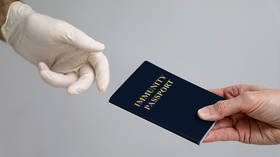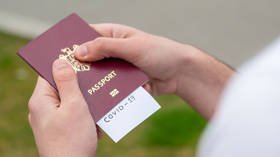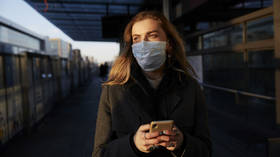Governments may see immunity passports as a way of reopening societies, but they’re a plunge towards totalitarianism

The idea of immunity passports is gaining in popularity among Western governments. But they are fraught with problems, from their implementation to their functionality. Above all, they’re a grave threat to fundamental freedoms.
Ordinary passports may not be much good to many of us for a while, with little possibility of foreign travel. But what if you needed a passport to leave your house and go about your daily life? In a world dominated by coronavirus, immunity passports are increasingly being talked about as a possible path out of lockdown. But what exactly would this path entail?
Also on rt.com Welcome to the post-Covid future: Face masks, elbow bumps, and the end of freedomTrack, trace, erase?
The basic premise of an immunity passport is to hasten the reopening of society by allowing those who are immune to Covid-19 to move freely, leaving only those who are not immune subject to restrictions. The passport itself might be a paper certificate, such as those that Chile has been issuing, although, in Europe and America, it would more likely appear on your smartphone as an app, code or as digital certification.
This has been the solution adopted in China. All Chinese people have had to register for a QR code that downloads an app. The app uses a traffic-light system that sorts people into red, yellow or green groups based on their health status and Covid-19 risk level – although how this is determined is not transparent.
Users have to input a range of personal information, including the purpose of their visit to new locations. To stop them circumventing the app, they need to use its QR code to enter certain public buildings and transport. Other East Asian nations, including Taiwan, Singapore and South Korea, have adopted similar systems.
It is doubtful whether this level of surveillance could happen soon in the West – mainly because our governments are incapable of this scale of organization. Outsourcing surveillance to a private corporation, however, might solve that problem. The British government has been consulting technology company Onfido, which specialises in facial biometrics, about immunity passports, which it says may be “possible in months.”
And in the US, Google and Apple have announced that they are teaming up to develop contact-tracing technology based on Bluetooth, which will “help countries around the world slow the spread.” But amid all the excitement, few have stopped to question what good exactly immunity passports are supposed to do.
Surveillance, yes. Testing, no
Cyber-security expert Jennifer Granick has told ABC News that “no contact-tracing app can be fully effective until there is widespread, free, and quick testing.” But many countries have utterly failed to implement mass testing. Even if they had done a better job, the tests are unreliable, delivering 50 to 70 percent false negatives. And it is still not known whether those who have been infected have antibodies, and if they do, whether antibodies reliably confer immunity or for how long.
Furthermore, recent developments suggesting that there are multiple strains of the coronavirus at large may render any research on Covid immunity done up to this point null and void. (In fact, the British government is shying away from calling them immunity passports, in case they don’t work – expect new branding imminently.) Despite all this, the lack of a fast, reliable antibody test doesn’t seem to be slowing efforts to expand surveillance technology.
Also on rt.com If Spain’s loosened lockdown brings SECOND WAVE of Covid-19, Western lockdowns could extend for MONTHSHaves and have-nots
There are other problems built into the notion of immunity passports. Some have speculated that if they become the pathway to freedom, people will be so eager to become immune that they will deliberately try to get infected with coronavirus. Why would a young and healthy person want to be confined for even longer, when their friends with antibodies are partying it up without them?
In a sense, the passport could become a brand of superiority in a new two-tier society. The haves (or the had-its) are free to come and go as they please, flashing their proof of antibodies like a biological membership card of a glamorous club: the outside world. Fraud and even violence become possibilities if people are divided like this.
And as usual, one group would benefit above all others: the celebrity and millionaire class. Were immunity passports rolled out tomorrow, who do you think would be the first to receive theirs? How long would you have to wait imprisoned in your own home, first to receive a test, then while you await the results, and, finally until you’re issued with the certificate of freedom itself? All the while, the rich and famous would be back gallivanting around the globe while sermonising on social media about ‘the new normal.’
New Big Brother
But the biggest problem with immunity passports is, of course, their implications for civil liberty. Proponents of immunity passports may accuse me of being a bug-eyed, David Icke-style conspiracy theorist, imagining jackbooted secret police commanding downtrodden citizens to ‘show us your (immunity) papers.’
They expect us to be relieved that all we have to swallow are colourful apps on our sleek smartphones. I have no doubt that there will be no jackboots, no chained dogs, and no assault rifles.
No, this is not the world of the police states of the 20th century. Young men in uniform are no longer the personification of oppressive regimes. Smartphones, algorithms, and mass surveillance have replaced them. And the people running the show will not even be the politicians we vote for after made-for-television election cycles. They will instead be Big Tech corporations, international spying agencies and shady cabals that blur the lines between governments, capital and the media.
Immunity passports are a breach of a fundamental rule of thumb, which previous generations fought and died for, but so many young people now have never been taught about. One principle remains true, even in a time of crisis – especially in a crisis, in fact, as that’s when principles matter the most. That principle is this: that you should never have to identify yourself to the state. The state should identify itself to you.
Like this story? Share it with a friend!
The statements, views and opinions expressed in this column are solely those of the author and do not necessarily represent those of RT.
















